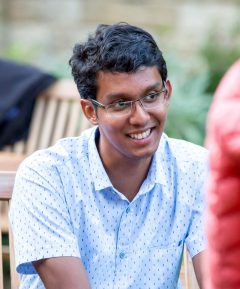
Dr. Jyotirmoy Mandal, 2019 Fellow, writes about his take on the UK Global Meeting.
The concept at the heart of our Fellowship is that the world’s most pressing problems, the greatest challenges facing our society, will only be overcome when science can work across disciplinary boundaries.
At a time when collaborations between research groups with different specializations are becoming a norm, the idea can sound like a cliché, but the ‘interdisciplinarity’ we explored in the recent UK Global Meeting was, for me, a departure from what I see as the prevailing definition. It represented, perhaps, a long overdue return to an earlier one.
To researchers in my field of study, ‘interdisciplinarity’ often takes the form of collaborations between scientists from different disciplines in large projects – a project on graphene-based electronics, for instance, may involve a research group which makes graphene sheets and another which integrates it into devices. However, while such initiatives align independent expertise to achieve a research objective, they may not encourage crosstalk between disciplines – the expert who makes the graphene may only focus on her part while the electronics expert focuses on his. Collaborations of this nature can and do yield meaningful results, but they may not fully overcome the compartmentalization of skills and knowledge within individuals. And to a mind where ideas are born, that can limit rather than inspire.
If the goal of ‘interdisciplinarity’ is to create pathbreaking scientific ideas and perspectives, perhaps it should be fostered not only between research groups or individuals, but also within individuals themselves. The recent Global Meeting, centered in Oxford, was clearly designed to impress this idea upon us Fellows. On the very first day of the Meeting, our cohort learnt about how the Schmidt Science Fellows program draws inspiration in part from the Oxford Philosophical Club. Formed in the 17th Century at Wadham College, Oxford, the club was a place of collective discussion and scientific experimentation by polymaths like John Wilkins, Thomas Willis, Robert Boyle, Robert Hooke, and Christopher Wren. Their impact on diverse fields like astronomy, architecture, neuroscience, physics, and medicine is well known. But perhaps more interestingly, each of them was themselves an expert in multiple disciplines, which would have provided unique insights and yielded revolutionary ideas.
Hooke is a captivating story. He studied microscopy, biology, and, geology – an interdisciplinarity that led to his realization that fossils wrought in stone shared similar microscopic features to living organisms. A scientist without his breadth of knowledge and interest in different disciplines may not have made such a connection even today.
Amidst the highly competitive and time-constrained lives of academics these days, it is difficult to imagine a modern society along the lines of the Oxford Philosophical Club – But perhaps ‘interdisciplinarity’ within the individual could be achieved by focusing on scientific questions, which are seldom bound by disciplines, rather than skills, which are valuable but often narrow. In “Ante-disciplinary Science”, which the fellows read during the meeting, Dr. Sean Eddy states that “Progress is driven by new scientific questions, which demand new ways of thinking. You want to go where a question takes you, not where your training left you.” To me, “finding questions and going where those lead to” is the most organic way for individuals to achieve “interdisciplinarity”. Wondering about why butterfly wings are iridescent could lead an entomologist to learn optics, while an optical physicist could find inspiration in insects for his designs – as scientists, perhaps a sense of wonderment and openness is what we need most.
Interdisciplinarity can also go beyond science. During the Global Meeting, I had the opportunity to spend time speaking with Dr. Elizabeth Kiss, Warden and CEO of the Rhodes Trust, about Nobel Laureate Dr. Baruch Blumberg, whose contributions to medicine and genetics were made possible in part by his understanding of anthropology. And in conversations and activities during the Meeting, I listened to the fellows’ personal thoughts on topics such as the impact of artificial intelligence on society and developing scientific solutions to help people living in refugee camps. What I took away from these discussions is that scientific and technological advances can be nuanced by perspectives from fields like the social sciences and history. As scientists, it is important for us to be mindful of our work’s broader impact on society, and being able to evaluate ourselves from extra-disciplinary perspectives can both inspire and guide our research.
There remain questions, however. During one of my final goodbyes before leaving Columbia to begin my Fellowship placement at UCLA, my PhD advisor remarked, “If you intend to go into academia, you should start thinking about the departments to which you are going to apply.” That left me wondering about what my work at end of my pivot as a Schmidt Science Fellow would make me – would I be a fledgling optical physicist with a focus on energy issues, or an energy scientist with a beginner’s training in optics? How accepting would academic institutions be of scientists with mixed backgrounds? To me, the Schmidt Science Fellowship is a rare and lucky opportunity for the Fellows to make a compelling case for interdisciplinarity through our research, and come to together as a cohort in the spirit of a modern-era philosophical society. I look forward to deep conversations with the Fellows in my cohort, my mentors on the Academic Council, and the greater Schmidt Science Fellows community to advocate for interdisciplinary science and to find my own professional path in the coming years.